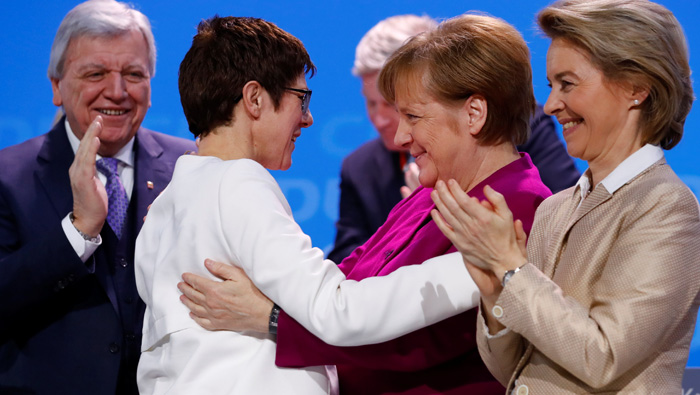
Berlin: German Chancellor Angela Merkel's conservatives on Monday approved a coalition deal with the Social Democrats (SPD), bringing closer a fourth term for her as well as an end to political limbo in Europe's preeminent power.
The more formidable hurdle to ending a five-month political impasse comes next week, however.
On March 4, results of a binding postal vote by members of the centre-left SPD will be announced and they are far less certain.
"Now I can only say to the SPD that I hope many members feel the same responsibility for giving Germany a good government," Merkel said in an interview with broadcaster RTL.
"I think we can achieve a lot together for Germany and its people."
The vote at a CDU congress followed Merkel's announcement of her picks for a new, younger cabinet intended to revive the party, which has been riven by disagreements over how to respond to the Alternative for Germany (AfD) since losing votes to the far-right party in national elections in September.
The CDU's youth wing has called for the party to renew itself in the wake of its worst election result since 1949 in September and Merkel, 63, stressed in her speech to delegates at the CDU gathering that younger faces were in the new team.
Earlier, she reassured CDU delegates that the new German government, which will steer Europe's largest economy, would not take out any new debt, would avoid tax increases and would seek to renew the European Union.
Monday's vote came as a poll showed support for both Merkel's conservative bloc - which also includes the Bavarian Christian Social Union (CSU) - and the SPD rising.
Delegates cast aside whatever doubts they may have had in Merkel by voting overwhelmingly to appoint a centrist candidate she had hand-picked as the CDU's new secretary-general.
Promising to lead a centrist mass party, Annegret Kramp-Karrenbauer, 55, dubbed "mini-Merkel" by some media, won the backing of more than 98 per cent of delegates after making a pitch that opposed demands from Merkel's critics for the party to move right to recapture votes lost to the nationalist right.
Her Catholic, western German background contrasts with Merkel's Protestant, eastern roots.
While socially conservative, Kramp-Karrenbauer is also a strong supporter of the minimum wage and workers' rights.
"I'm glad that there's strong support for the coalition agreement, and that we now have a general secretary who got a super result," Merkel said after the vote. "The work can begin."
Apart from pledges on tax and debt, Merkel also committed the new government to ensuring fast internet is available everywhere in Germany by 2025, raising research spending, creating 8,000 nursing jobs and taking a "zero tolerance" policy on security.
Merkel said conservatives secured wins in coalition talks with the SPD, including preventing what she called the "aberration" of a single healthcare system that the SPD had demanded to replace the current dual public-private system.
She disappointed many conservatives, however, by agreeing to give the SPD the powerful finance ministry.
She said it was a "painful" loss but added it was right not to let negotiations collapse over cabinet portfolios rather than policy substance.
She also underscored the importance of the economy ministry - which the CDU will retake after years in SPD hands.
After 12 years as chancellor and almost 18 years in charge of her party, Merkel's authority is waning and on Sunday, she responded to growing calls for new blood at the top of the CDU.
Her efforts to forge a coalition with two smaller parties collapsed in November.
That forced her to woo back the SPD, which was the coalition partner in her 2013-2017 government but reluctant to repeat the experience after seeing its own support dwindle to its lowest since World War Two.
If SPD members vote "no" in their ballot, the most likely outcome is a new election or possibly a minority government.
Experts say a snap election could result in further gains for the anti-immigration AfD, which entered parliament for the first time in September.
Some analysts said the prospect of a new election would spur SPD members into voting "yes", so as to prevent a further deterioration in support for their party.
A Forsa poll on Monday showed the SPD up two points from a week ago, at 18 per cent, while the CDU/CSU edged up one point to 35 per cent.
The AfD remained the third strongest party with 13 per cent.
Forsa researcher Manfred Guellner said the grumbling in both camps had abated since Merkel proposed Kramp-Karrenbauer for CDU general secretary and former SPD leader Martin Schulz decided against joining a Merkel-led cabinet as foreign minister.